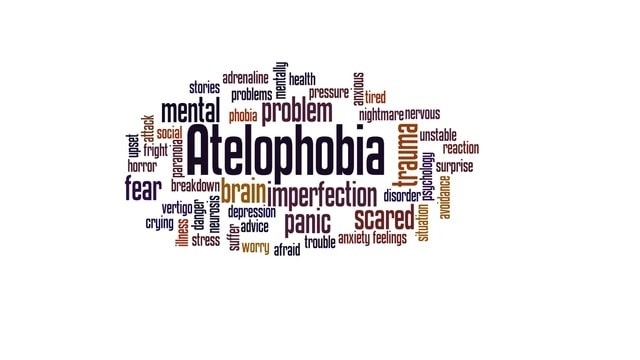Atelophobia
Atelophobia is an intense fear of imperfection. Sufferers tend to judge themselves very harshly and often set unrealistic goals.
Symptoms of Atelophobia
The symptoms experienced by people with a phobia of imperfection are:
- Easy to get angry.
- Feeling excessively tired.
- Depression or feeling sad.
- Inability to accept criticism.
- Inability to concentrate on anything other than their fear.
- Pessimism (negative outlook on life).
Atelophobia can also cause panic attacks. This condition is characterized by:
- Feeling hot and cold.
- Dizziness or headache.
- Excessive sweating.
- Palpitations or increased heart rate.
- Nauseous.
- Shortness of breath (dyspnea).
- Shiver.
- Stomach ache or indigestion (dyspepsia).
Causes of Atelophobia
The exact cause of this phobia is unknown. However, the risk is higher for people who are under great stress and are afraid of their own imperfections.
Risk Factors for Atelophobia
The triggering factors for atelophobia are:
- Genetics. Hereditary factors increase a person’s risk of developing a phobia of imperfection.
- Mental and physical threats. This condition is related to unpleasant experiences in the past. Among them are getting mental and physical threats.
- Traumatic experiences. Childhood trauma, including physical abuse, can be traumatic in itself, and a person may grow up with certain fears.
- Environment. This factor can come from the wrong parenting style when parents require everything to always be perfect.
- Emotional conflict. This condition can be an inner conflict that is kept and never resolved.
- Perfectionism. Atelophobia disorder can originate from the perfectionist nature of the sufferer.
- Sensitive personality. Someone who is sensitive and always insecure or not confident is at high risk of experiencing a phobia of imperfection.
Diagnosis of Atelophobia
First, the doctor will ask about the symptoms and medical history of the sufferer. Then, the medical team will perform a complete physical examination to confirm the diagnosis of the disease.
Atelophobia can be seen when:
- Sufferers always avoid certain situations such as gathering or socializing because they are afraid of making mistakes.
- The sufferer experiences the symptoms mentioned for more than six months.
- Sufferers have severe anxiety when thinking about mistakes or fear of disappointing others.
- Sufferers tend to experience problems at home, work, or school due to fear of imperfection.
People with atelophobia tend to have other mental problems, such as:
- Avoidant personality disorder.
- Anxiety disorders (hypochondriasis).
- Obsessive-compulsive disorder.
- Panic disorder.
- Paranoid personality disorder.
- Post-traumatic stress disorder (PTSD).
- Substance abuse disorders such as drug addiction or alcohol use disorder.
Atelophobia Treatment
The steps taken to overcome the phobia of imperfection are:
- Cognitive behavioral therapy (CBT). CBT focuses on helping people change the way they think about imperfections. It can help identify specific triggers that cause anxiety.
- Exposure therapy. This can help reduce sensitivity to the fear of imperfection.
- Lifestyle changes. Sufferers are advised to adopt a healthy diet and exercise regularly to help improve mood and reduce negative thoughts.
- Medications. This step aims to reduce the symptoms of depression or anxiety that accompany atelophobia. The types of drugs recommended are antidepressants, anti-anxiety drugs, tranquilizers, or beta-blockers.
Complications of Atelophobia
One of the complications that can be experienced by sufferers is an increase in symptoms that have an impact on decreasing quality of life. As a result, they will isolate themselves and be reluctant to socialize in their social circle.
Prevention of Atelophobia
As for the steps to prevent disease, namely:
- Create a strong support system. This can come from close friends and family members.
- Avoid caffeine, drugs, or alcohol. These substances can worsen existing anxiety.
- Share your fears and concerns with a mental health professional, such as a psychologist or psychiatrist.
When to see a doctor?
It is recommended to see a doctor immediately if you experience symptoms in the past few months. Especially if the condition has hampered your activities and socializing.
While undergoing treatment, sufferers can take supplements to help keep their bodies in top condition.

